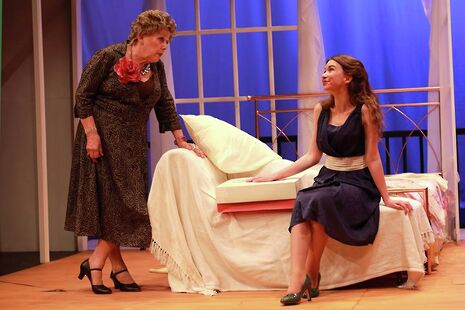Cat on a Hot Tin Roof
Shounok Chatterjee finds this adaptation of the classic play sadly lacked some emotional depth

Soft diaphanous blinds hang elegantly from the imposing white arches of the open windows of Big Daddy’s ranch and there is a stifling smoky haze still clinging to the warmly lit stage. The Combined Actors of Cambridge's fiftieth anniversary adaptation of Tennessee William’s Pulitzer Prize winning canonical work Cat on a Hot Tin Roof is mesmerisingly reminiscent of Richard Brook’s 1958 film adaptation. As the action unfolds though, one glaring, and for me ultimately insurmountable, incongruity emerges; no one has managed to nail the accent. There is a slightly cringe-worthy and ultimately distracting effort to shape resistant cheeks into unsettling shapes over vowel sounds in the effort to create something vaguely resembling the vernacular of the Deep South. And when characters get caught up in sharper exchanges of dialogue there are frequent and jarring slips back into natural registers.
There are moments of promise in the first act where the sprightly Jenny Scudamore who plays Maggie, the cat, is genuinely moving as the spurned wife of the taciturn and tormented Brick. She is especially good at the ‘catty’, delivering with delectable poison in her observations of her nephews and nieces, the ‘no-necked monsters’, but less good at the nuanced shades in Maggie’s psychology. In the 1971 edition of his play Williams observes of Maggie that "her voice has range and music; sometimes it drops as low as a boy’s and you have a sudden image of her playing boys’ games as a child". I thought that this change in tone, from the nervous energy of the wife preening herself and dealing in the petty politics of family to the self-centred ambition of a woman from a poor background to secure her place in society should have been more evident. By making this shift in tone more evident the complex power play between Brick and Maggie would have become more nuanced, but instead much of the listless first act boiled down to a servile Maggie begging for forgiveness.
Robin Owen as Brick comes into his own in the second act; he is a dark, brooding, figure on the edges of the scene with a constantly palpable energy and quite convincing in his heroic confrontation with his father, Big Daddy. Notwithstanding some obvious blunders, such as breezily walking through a locked door, Gillian Francis as Big Momma provides welcome comic relief with her endearing and hilarious version of the matriarch as a feckless busybody. The sad consequence of her larger than life interpretation though was that the denouement lacked emotional punch, this seemed especially apparent in her earnest plea to Maggie to help her sort Brick out which seemed weak and childish rather than genuinely affecting.
Despite a sumptuous realisation of the historical period in set and costume and brief moments of pathos, Sarah Ingram’s adaptation becomes a caricature of that aesthetic as the artificiality of her characters become increasingly apparent.
 Comment / Plastic pubs: the problem with Cambridge alehouses 5 January 2026
Comment / Plastic pubs: the problem with Cambridge alehouses 5 January 2026 News / SU stops offering student discounts8 January 2026
News / SU stops offering student discounts8 January 2026 Theatre / Camdram publicity needs aquickcamfab11 January 2026
Theatre / Camdram publicity needs aquickcamfab11 January 2026 News / Cambridge academic condemns US operation against Maduro as ‘clearly internationally unlawful’10 January 2026
News / Cambridge academic condemns US operation against Maduro as ‘clearly internationally unlawful’10 January 2026 Comment / What happened to men at Cambridge?31 December 2025
Comment / What happened to men at Cambridge?31 December 2025








